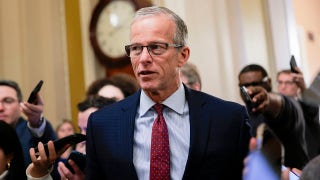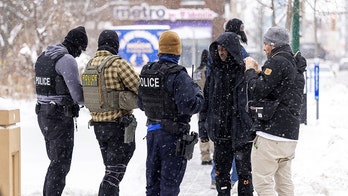Fox News Flash top headlines for January 19
Fox News Flash top headlines are here. Check out what's clicking on Foxnews.com.
The Republican-controlled Wisconsin Assembly gave a final, bipartisan push Thursday to a proposed constitutional amendment that would make it harder for violent criminals to get out of jail on bail.
The measure will now go before voters to be ratified in the statewide April 4 election. Its passage in the Assembly by a 74-23 vote marks the culmination of a push by Republican lawmakers to speed the amendment before voters.
Putting the amendment on the April ballot gives the Republican-controlled Legislature a chance to score an early win in the new legislative session while avoiding a veto from Democratic Gov. Tony Evers. The proposal’s popularity with conservatives could also drive supporters to the polls in a pivotal election that will determine ideological control of the state Supreme Court.
WISCONSIN GOV. TONY EVERS WILL CONSIDER MORE STRINGENT BAIL LAWS AFTER WAUKESHA CHRISTMAS CARNAGE
State law requires the Legislature to approve constitutional amendments in two consecutive sessions before sending them to the ballot for voters to ratify. The governor cannot veto constitutional amendments. The Senate gave its final approval Tuesday. both chambers first passed the bail amendment in February 2022.
"It is a huge step in the right direction for holding violent, career criminals accountable," Republican Rep. William Penterman said.
The amendment would require a judge to consider a defendant’s potential risk to public safety, including their criminal history, when setting bail. Currently, cash bail is set only as a means to ensure the person appears in court. Democrats have argued the amendment could create further inequity in the criminal justice system by allowing wealthy defendants to more easily get out of jail.
"If we’re serious about safety, there are other measures to do that," said Democratic Rep. Dora Drake, pointing to reforms that are backed by liberals such as eliminating cash bail.

Wisconsin voters will soon decide on a constitutional amendment to make bail more difficult to obtain. (AP Photo/Harm Venhuizen)
Opponents also have focused on what they see as a glaring problem in how the law could be applied. The added considerations in setting bail would apply only to violent criminals, but state law currently offers three different definitions for what constitutes a violent crime. Judges would have to decide which definition to follow unless and until lawmakers clarify what definition applies to bail.
Republican Rep. Cindi Duchow, the amendment's chief Assembly sponsor, said Thursday that she plans to introduce a definition in the coming weeks that would include crimes such as rape, child molestation, human trafficking and murder but not extend to misdemeanor offenses. Opponents were concerned lawmakers might wait until after the law was passed to define its scope.
Amendment supporters have been working since 2017 to pass it. Their efforts gained momentum in 2021 after Darrell Brooks Jr. drove his SUV into a Waukesha Christmas parade, killing six people. Brooks had posted $1,000 in an earlier case just two days before the Nov. 21 parade. Sen. Van Wanggaard, the bill's lead sponsor, said Tuesday that the measure was not a reaction to the parade killings.
Earlier this month, the state Supreme Court in neighboring Illinois halted a law that would have ended the state’s cash bail system. The California Supreme Court ruled in 2021 that it's unconstitutional to impose cash bail on a defendant who can't afford it. Legislators in that state have been working for months to end the cash bail system but their efforts have so far failed.
Assembly Speaker Robin Vos said Republicans would not consider measures to end cash bail altogether.
The Assembly was also slated Thursday to consider an advisory referendum that Republicans want to place on the April ballot. The nonbinding measure would ask voters if they believe that welfare recipients should be required to look for work.
State law already requires recipients of unemployment benefits to look for jobs. Republicans have also passed work-search requirements to receive other welfare benefits, but COVID-19 pandemic restrictions from the President Joe Biden's administration have put those laws on hold.
CLICK HERE TO GET THE FOX NEWS APP
After the Senate approved the ballot question Tuesday, Senate Majority Leader Devin LeMahieu suggested the results, which would not change state law, could be used to back a push to require some Medicaid recipients to look for work.












































